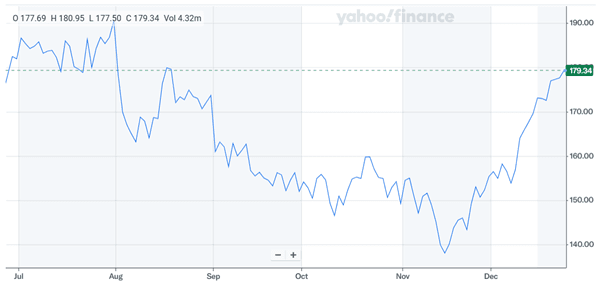Inside Boeing’s $36 Billion Comeback: How the Aviation Giant Plans To Soar Again!

Boeing (NYSE:BA) has been making headlines with a series of bold moves aimed at restoring its reputation and financial stability after facing one of the most challenging periods in its history. The aerospace giant, once a benchmark for engineering and manufacturing excellence, found itself grappling with production halts, regulatory scrutiny, labor strikes, and mounting debt. However, recent developments suggest that Boeing is laying the groundwork for a resurgence. The company has resumed production across its major airplane programs, committed significant investment to ramp up capacity, secured a record-breaking $36 billion deal with Turkey's Pegasus Airlines, and announced a strategic plan to rebuild its culture and operational discipline. With a $0.5 trillion backlog and renewed efforts to streamline operations, Boeing is signaling its intent to reclaim its leadership in the aerospace industry. Despite these efforts, challenges remain, and the path to recovery is far from certain.
Resumption Of Production Across Key Programs
Boeing's ability to resume production across its 737, 767, and 777/777X airplane programs marks a pivotal moment in its recovery journey. After months of disruptions caused by a machinist strike that idled factories, the company’s production lines are once again operational. Boeing implemented a safety-management system to address potential manufacturing issues and ensure a smooth restart, emphasizing employee training and certification to meet rigorous quality standards. This resumption includes the highly anticipated 737 MAX jets, which had faced a prolonged production hiatus due to labor unrest and supply chain challenges. Boeing’s return to production aligns with its broader strategy to stabilize operations, address inventory imbalances, and regain customer confidence. Restarting production is not merely about meeting current demand but also preparing to scale up for future growth, with the company aiming to ramp production to meet its extensive backlog. This development signals to investors and stakeholders that Boeing is actively working to resolve operational bottlenecks and capitalize on robust demand for commercial aircraft in both domestic and international markets. The success of this initiative will hinge on Boeing's ability to maintain stability in its production systems while meeting stringent regulatory and quality requirements.
Investment To Boost 787 Dreamliner Capacity
Boeing's announcement of a $1 billion investment in its South Carolina operations to accelerate 787 Dreamliner production is another cornerstone of its turnaround efforts. The investment aims to increase the production rate of the 787 from approximately five units per month to ten by 2026, addressing a significant backlog of orders. This move is designed to tackle a series of challenges that have plagued the Dreamliner program, including regulatory scrutiny, manufacturing defects, and part shortages. The planned expansion includes infrastructure upgrades and the creation of 500 new jobs, signaling a long-term commitment to the program. Deliveries of the 787 were suspended for nearly two years due to production and safety issues, underscoring the complexity of the challenges Boeing faces in stabilizing its operations. However, with demand for wide-body aircraft rebounding, particularly for long-haul travel, Boeing's decision to ramp up Dreamliner production could position it to capture market share from competitors like Airbus, which also has ambitious production targets. By addressing past quality concerns and scaling up production capacity, Boeing is not only looking to meet existing orders but also to build confidence among customers and regulators that it can deliver consistently at scale.
Record-Breaking $36 Billion Order From Turkey’s Pegasus Airlines
Boeing recently secured a $36 billion deal with Turkey's Pegasus Airlines, marking the largest single order in the airline’s history and a significant victory over rival Airbus. The order includes firm commitments for 100 units of the 737 MAX 10 model and options for an additional 100 aircraft, with deliveries set to begin in 2028. This deal is particularly noteworthy as it reflects a strategic shift for Pegasus, which had previously committed to becoming an all-Airbus operator. For Boeing, this deal serves as a validation of its efforts to rebuild customer trust and recover market share in the competitive single-aisle aircraft segment. The 737 MAX 10, though yet to be certified, represents a critical product for Boeing as it looks to address growing demand for efficient, high-capacity jets. The deal also highlights the role of geopolitical and economic factors, as Turkey aims to bolster its position as a regional aviation hub. This order underscores the resilience of Boeing’s brand and its ability to win major contracts despite a history of production and certification delays. The success of this deal could also influence other carriers to consider similar commitments, further strengthening Boeing's commercial backlog.
Final Thoughts

Source: Yahoo Finance
We can see a marked rise in Boeing's stock price as the market is rewarding the company for its turnaround efforts, which happen to be a complex blend of operational, cultural, and strategic initiatives aimed at overcoming a tumultuous period. The resumption of production, investments in capacity expansion, landmark deals like the Pegasus Airlines order, and a focus on organizational efficiency collectively illustrate the company’s commitment to rebuilding its reputation and financial performance. However, challenges remain, including regulatory hurdles, supply chain vulnerabilities, and the need to restore confidence among customers and investors. While the company’s recent developments provide reasons for cautious optimism, the journey ahead is fraught with risks that could impact its recovery trajectory. Overall, we believe that a wait-and-watch approach is best suited with respect to Boeing’s turnaround strategy before making any investment decisions.




